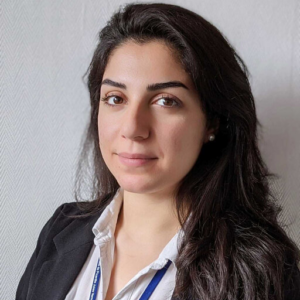Six New Postdoctoral Commercialization Fellows to be Supported by MEDC T3N, EDA Global Epicenter for Mobility (GEM)
12/20/2024
Innovation Partnerships is proud to announce the funding of six new postdoctoral commercialization fellowships. These fellows will be supported by the Michigan Economic Development Corporation’s (MEDC) Tech Transfer Talent Network (T3N), along with the U.S. Economic Development Association (EDA) Global Epicenter for Mobility (GEM) program and the Build Back Better Regional Challenge (BBBRC).
The 2024 fellows were selected based on the strong commercialization potential of their doctoral research. Their time in the fellowship program will provide them the opportunity to further develop their innovations into marketable products and services. Each postdoc will receive a fellowship of up to $50,000 to further advance their research including funding from T3N or EDA GEM and matching contributions from the university. In addition to their funding, fellows will also receive support from a Mentor-in-Residence provided by the T3N and GEM program. Awardees are selected for the postdoctoral commercialization fellowship by the Innovation Partnerships Ventures team. To be eligible for the fellowship, applicants must be a postdoctoral researcher from one of U-M’s three campuses and conducting research in an area that has strong commercialization potential. Furthermore, applicants must be nominated by their supervising Principal Investigator, with each applicant’s funding match committed prior to selection.
“The postdoctoral commercialization fellowship is one of the most transformative opportunities our ecosystem offers,” said Kelly Sexton, associate vice president for research – innovation partnerships and economic impact. “The program provides a unique pathway for postdocs to develop their ideas into impactful innovations. Through this fellowship, they have the chance to either license their technologies to industry partners or explore the path of becoming startup founders themselves. With commercialization mentorship at its core, the program equips fellows with the skills and confidence needed to turn their innovations into successful ventures. We are proud to have the continued support of MEDC’s Tech Transfer Talent Network and the EDA Global Epicenter for Mobility in bringing this vision to life.”
From a field of nine applicants this cycle, the following recipients were chosen for a T3N or EDA postdoc commercialization fellowship:
 |
Charlie Childs
Supported by T3N Internal Medicine at Michigan Medicine; PI – Jason Spence Childs is developing complex 3D models of the human intestine in the preclinical drug screening space. These human “mini guts” will allow drugs to be tested on human organs before moving to human clinical trials. This technology will allow researchers to mitigate risk, reduce reliance on lab animals and help identify safer, more effective drugs for patients in need. |
 |
Ijaz ul Haq
Supported by T3N College of Innovation and Technology at UM-Flint; PI – Khalid Malik Haq is developing a prototype system for deepfake detection technology with applications in courtroom settings. |
 |
Tomasz Kulakowski
Supported by EDA BBBRC/GEM University of Michigan Mechanical Engineering; PI – Solomon Adera Kulakowski is developing phase change materials for the thermal management of lithium-ion batteries to provide longer battery life, improved battery efficiency, minimized risk of overheating of battery packs and longer mileage range for electric vehicles. |
 |
Marco Mangano
Supported by T3N University of Michigan Naval Architecture; PI – Jing Sun Mangano is developing water turbine technologies for generating energy using water flows from rivers and tides. This technology has several advantages compared to other renewable energy sources, as it can provide higher resource predictability, lower intermittency, higher energy density and proximity of the energy source to demand. |
 |
Waad Naim
Supported by EDA BBBRC/GEM University of Michigan Chemical Engineering; PIs – Stephen Forrest, Andrej Lenert Naim’s research is focused on an innovative thermo-photovoltaic device that implements cell-level advances into a large demonstration module, revolutionizing long-duration energy storage. |
 |
Gabriel Saccol
Supported by T3N College of Engineering and Computer Science at the University of Michigan – Dearborn; PI – Wencong Su Saccol is developing a scaled-down prototype of a low-cost power converter that can be integrated with any commercial-grade photovoltaic panel. This prototype will have unique features including compatibility with a variety of second-life batteries and a user-friendly and low-cost battery management system. |
The fellows program has a proven track record of success creating economic and entrepreneurial growth. Notably, ten previous Postdoctoral Commercialization Fellows have gone on to become startup CEOs, collectively raising more than $100 million, with 90% of the companies continuing their ventures in Michigan.
“Our postdoctoral commercialization fellows exemplify the kind of ingenuity, talent and drive that makes successful entrepreneurs,” said Ben Marchionna, the chief innovation ecosystem officer for the MEDC and State of Michigan. “Commercialization of university research is key to strengthening our state economy, and these innovators are at the forefront of this important mission.”
About Innovation Partnerships
Innovation Partnerships serves as the primary gateway for researchers seeking to increase the impact of their work. We provide this service to U-M faculty by connecting with the private sector through corporate-sponsored research collaborations, licensing discussions or connections with entrepreneurs and investors to support startup company formation. Our team of licensing, business development and investment professionals provides comprehensive step-by-step service to faculty starting with invention assessment and intellectual property support, followed by business mentoring and connections to early-stage capital from the Accelerate Blue Fund. We are a unit within the Office of the Vice President for Research.
For more information, please visit https://innovationpartnerships.umich.edu.
About Michigan Economic Development Corporation (MEDC)
The Michigan Economic Development Corporation is the state’s marketing arm and lead advocate for business development, job awareness and community development with the focus on growing Michigan’s economy. For more information on the MEDC and our initiatives, visit www.MichiganBusiness.org. For Pure Michigan® tourism information, your trip begins at www.michigan.org. Join the conversation on: Facebook, Instagram, LinkedIn, and Twitter.
Join the conversation on: Facebook, Instagram, LinkedIn, and Twitter.
About the Tech Transfer Talent Network
The Technology Transfer Talent Network (T3N) is a statewide university network designed to support the commercialization of university technologies, licenses to industry and startup creation through key talent programs.
The Technology Transfer Talent Network (T3N) was created in 2012 to enhance the commercialization of university opportunities with talent programs and resources, made possible thanks to funding support from the Michigan Economic Development Corporation (MEDC), the statewide economic development organization for Michigan, matched by each participating university. T3N was conceived by the University of Michigan to share best practices and provide mutual support among six other sister Michigan research universities: Grand Valley State University, Michigan State University, Michigan Technological University, Oakland University, Wayne State University and Western Michigan University.
About the U.S. Economic Development Association (EDA) Global Epicenter for Mobility
The Global Epicenter of Mobility (GEM) coalition is leveraging a $52 million BBBRC grant to addresses the rising global competition in the electric and autonomous vehicle market, rapid pace of innovation in new mobility solutions, and an aging workforce that needs continuous reskilling to keep up with new products and technologies. The coalition is tackling these issues through a supply-chain transformation center, a workforce training initiative, and an accelerator network.

